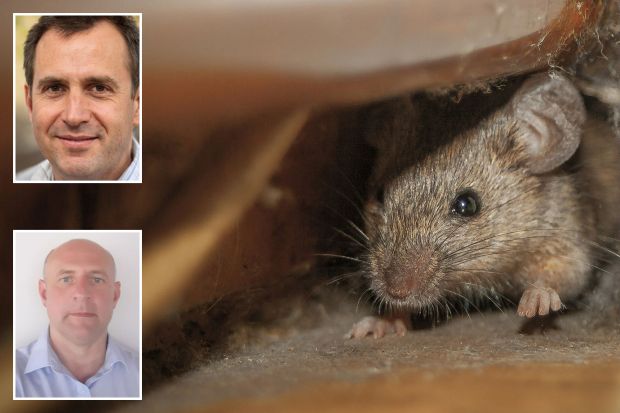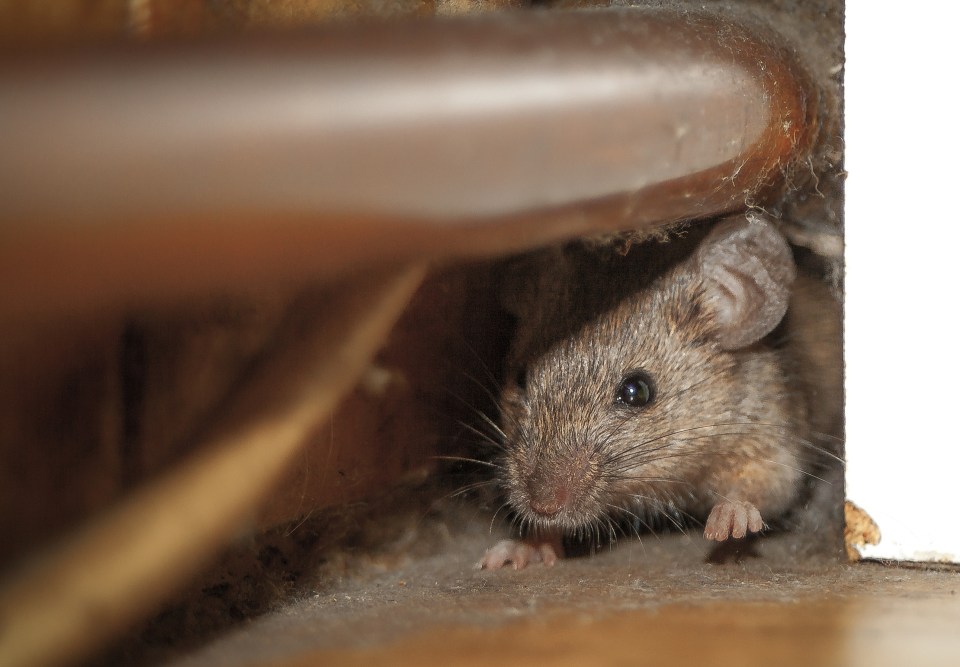I’m a pest expert – cheap & simple tricks to help deter spiders, flies, mice & foxes at home as the weather gets warmer

A lovely summer breeze may not be the only thing finding its way into your homes this spring and summer.
Unfortunately with the increase in temperature comes a whole host of unwanted guests - including the likes of rodents, spiders and foxes and even fruit flies.
But according to pest control experts Robert Collins and John Stewart, there's absolutely no need to start freaking out juts yet.
Speaking to Fabulous, they've shared plenty of simple and cheap tricks you can do to help deter these pests from your homes and gardens as the weather gets warmer...
RODENTS
1. Keep bird feeding to a minimum
According to John, who is from the technical team at , limiting bird feeding can be imperative to prevent rodent attraction in your home.
READ MORE ON HOMES
"As an alternative, place bird feeders out during the day but don’t forget to remove them before the evening," he says.
“Use specialist bird feeders too, rather than scattering food in your garden as this could attract rats.”
2. Check for unwanted entry points
As rodents can get through tiny gaps, John says it's important to check for these around your home to stop them from sneaking in.
Most read in Fabulous
FABULOUS BINGO: Get a £20 bonus & 30 free spins when you spend £10 today
“Be sure to look out for any building defects, holes in pipework, gaps at the front and rear steps, damaged airbricks, large weep holes, and gaps under window ledges," he explains.
“Inside your home, check that gaps under the doors including the garage are no greater than 1.3cm.
"Also clear out stair cupboards where rodents could make a winter nest."
John adds: “Cutting vegetation away from the home also prevents harbourage for rodents and allows for inspection for building defects and rat burrows.”
Meanwhile, ’s pest control expert Robert suggests using steel wool steel wool to block the access points to your garden.
"If there are any visible access points where you know the rats are entering and exiting from, stuff some steel wool into these gaps," he advises.
"Steel wool is a great barrier as it’s difficult for rats to nibble at steel wool.
"They'll eventually give up when they find they can’t get through it."
3. Cut off food sources
John explains that with mice taking refuge indoors during cold months food supplies will be of easier access to them.
"Ensure any open food products are stored safely in sealed containers," he advises.
“Place foodstuff in cupboards high up to prevent consumption and contamination and ensure rubbish bags are placed in secure bins to deny further food sources for rodents.”
4. Onions
Robert points out that rats really don't like onions and just the scent of them is one of the best non-toxic ways to get rid of them from your garden.
"The pungent smell of onions can deter rats and prevent them from wanting to enter the garden," he explains.
"Cut a few onions into slices and spread these slices around the edge of your garden or close to any visible entry points."
5. Owls Feathers
Robert highlights that rats are very smart beings, with research proving they're smart enough to sense any threats within their surroundings.
"One of the most interesting things that rats learn how to do is how to act in the presence of predators and how to escape an owl attack," he explains.
"A great way to deter rats is to place feathers from their natural predators close to their habitats or close to any visible entry points to your garden."
6. Essential Oils
Pest control expert Robert also suggests several essential oils that can be used to deter rats from your garden.
"This is one of the safest and most effective natural ways to get rid of rats," he says.
"Peppermint, Eucalyptus, and Citronella are great examples of essential oils that are brilliant at deterring rats.
"The strong smell of these oils can easily dissuade rats.
"Simply mix together your chosen essential oil in a spray bottle.
"The mixture should consist of 1 part essential oil and 9 parts water.
"Then, spray this mixture around the edges of your garden and in any space that you may suspect is a habitat for the rats."
7. Ammonia
Robert also notes that ammonia is great for repelling rats due to its "very pungent smell."
He advises: "Mix together some ammonia with water in a bowl and then place this bowl outside close to the rat’s habitat.
"Just be careful not to put it close to any plants in case the bowl gets knocked over as the ammonia could kill your plants."
SPIDERS
1. Ensure doors and windows are fully sealed
Pest expert John explains that spiders enter the home via gaps under doors and around windows.
"Ensuring that a good seal around window frames and excluder strips fitted to the bases to doors may help to prevent entry," he says.
Robert agrees, adding: "If you leave windows or doors open through the day, install screens to keep spiders out."
2. Eliminate spiders’ sticky silk
According to John, it's important to remove any spider webs as soon as you see them in your home.
“Spiders will often lay their eggs in sack, held in position with sticky silk around windows and doors," he explains.
"Removing these with a hard bristle brush will help to keep their numbers in check around the home.”
3. Use home remedies
John explains that spiders are most commonly found in the home when the external temperatures drop and there's a lack of insects for them to feed on.
"In households, they can be observed walking across our floors, in the corners of rooms and scuttling around our baths," he says.
“There are many weird and wonderful home remedies that can make homeowners more at ease, such as placing horse chestnuts in the corners of rooms and on window ledges.”
Robert adds that peppermint oil is another great example as it emits a strong scent which repels spiders.
"Add 15 – 20 drops of peppermint oil to a spray bottle with water and spritz this in any areas where you’ve noticed spiders in the home," he says.
He also notes how vinegar works in the same way as peppermint oil.
"Fill a spray bottle with equal parts white vinegar and water and spritz the mixture around your home," he advises.
5. Spider catchers
Pest control expert Robert points out that spider catchers are great devices for humanely removing spiders from your home.
"This hand-operated stick features gentle fibres at the end, designed to pick up spiders safely," he explains.
"The device holds the spider securely in the fibres so you can move it outdoors to be released."
6. Use insecticides
According to Robert, there are many insecticides available for getting rid of spiders.
"Spray treatments can be used along the edges of your home and underneath the furniture to form a barrier that can kill or repel spiders," he says.
FOXES
1. Remove food sources
“Foxes are optimistic feeders and are often in search of food or secluded locations to create a den to raise their families, making gardens a prime location for foxes to venture," says pest control expert John.
“To prevent foxes from tipping your outdoor bins and compost heaps over in search of food, place them on firm ground with a lid to ensure they can’t be easily knocked over.
"Also cut back vegetation that could provide shelter and discourage neighbours from feeding foxes as this will lead to frequent visits from adults and their cubs."
Robert agrees, adding: "If you feed other animals in the garden, consider using specialised feeders so that foxes can’t get to the food inside, and also cover up any sources of water."
2. Build a fence
John says that to protect your garden from foxes, your efforts are best invested in fencing.
"Build a fence around the perimeter of your garden that is at least two metres high and ideally buried in the ground to stop the foxes digging underneath," he suggests.
"If you own rabbits or chickens that are housed in outdoor structures, add an additional fenced barrier to protect them from hunting foxes."
He adds: “Fences and walls can also have spikes placed on top of them to prevent foxes from climbing over and along them.
"Also consider adding a hard structure to the edge of your pavement to deter them from digging in these areas too."
Pest control expert Robert also advises blocking any entrances to spaces where foxes could hide such as sheds or under decking.
3. Use a repellent
“If you do want to use fox repellents, they're available with differing effectiveness to deter them from your garden," says John.
"Outdoor repellents are also a way to prevent foxes from entering the garden without causing harm."
He adds: "The Pest-Stop is an ideal, non-chemical solution that emits frequencies through powerful speakers to repel unwanted animals.”
FRUIT FLIES
Robert points out that fruit flies come into your home for your food sources.
"They're very good as seeking out rotting fruits, vegetables, and plant material and they’ll do anything to get their hands on it," he explains.
"The best way to prevent a fruit fly infestation is to cut off their food supply."
He goes on to suggest cleaning out your drains to prevent them from breeding.
"Ensure that all food is thrown away when it’s gone bad," the pest control expert continues.
"Don’t just throw it in the kitchen bin - bad food should be disposed of outside.
"Clean up your pots as soon as you’ve eaten because bits of food that is left on the pots can attract fruit flies."
Read More on The Sun
Robert concludes by noting that similarly sweet drinks and wine in the bottom of glasses can also attract fruit flies.
"Be sure to wash up as soon as possible and avoid leaving dirty pots around," he advises.












